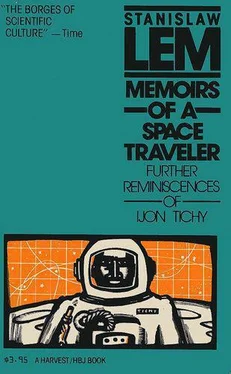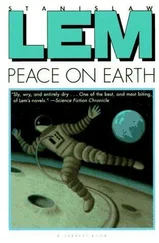Although the sheep was not a particularly trustworthy guide, I got out of the car again and began pushing through the brush. Soon the way became easier. It was already growing dark when, beyond a small lemon grove, there loomed the outline of a large building. The thickets gave way to grass so dry that it rustled underfoot like charred paper. The house, shapeless, dark, and exceedingly ugly, with the ruins of a portal, was surrounded in a wide radius by a high wire fence. The sun was setting and I still could not find an entrance. I began calling loudly, but with no result — all the windows were shuttered. I was losing hope that there was anyone inside when the gate opened and a man appeared.
He gestured to me the way to go; the wicket was in such a dense clump of bushes that I never would have suspected its existence. Protecting my face from the branches, I managed to reach it; it had already been opened with a key. The man who had opened it looked like a mechanic or a butcher. He was a paunchy, short-necked individual with a sweaty skullcap on his bald head. He wore no jacket, only a long oilskin apron over a shirt with rolled-up sleeves.
“Excuse me — does Doctor Diagoras live here?” I asked. He looked up at me with an expressionless face, large, misshapen, and puffy. The face of a butcher. But his eyes were bright and razor-sharp. Though he said not a word, I could tell from his glance that it was he.
“Excuse me,” I repeated, “you’re Doctor Diagoras, aren’t you?”
He gave me his hand. It was as small and soft as a woman’s, but it gripped mine with unexpected strength. He flexed the skin of his head, causing the skullcap to slide back, stuck both his hands in his apron pockets, and asked me with a shade of contempt:
“Just what do you want from me?”
“Nothing,” I shot back. I had undertaken this journey on the spur of the moment, wanting to meet this extraordinary person, and was prepared for almost anything. But I would not put up with insults. I was giving thought to my return trip as he stared at me, went on staring, and finally said:
“I guess it’s all right. Follow me.”
It was now evening. He took me to the gloomy mansion and entered a dim hall; when I stepped inside behind him I heard an echo, as if we stood in the nave of a church. Diagoras made his way through this darkness with ease. He did not warn me about the staircase step, and I tripped. Cursing to myself, I went up the stairs toward the faint light of a half-open door.
We entered a room with a single, shuttered window. The shape of this room, especially its unusually high, arched ceiling, reminded me more of the interior of a tower than of a home. It was crammed with huge, dark pieces of furniture, their polish dulled by age, including chairs with uncomfortably sculptured backs. On the walls hung oval miniatures, and in the corner stood a clock, a monstrous thing with a dial of burnished copper and a pendulum the size of a Hellenic shield.
The room was quite dark; the light bulbs in an intricate lamp with dusty shades barely illuminated a square table. The somber walls, covered with reddish-brown paper, absorbed the light, keeping the corners of the room black. Diagoras stood by the table, his hands in his apron pockets. It seemed as if we were waiting for something. I had just put my duffel bag on the floor when the great clock began ringing out the hour. In a clear, loud tone it struck eight; then something in it grated, and an old man’s voice exclaimed:
“Diagoras, you scoundrel! Where are you? How dare you treat me this way! Speak to me, do you hear?! For God’s sake, Diagoras… there’s a limit!” Both rage and despair trembled in these words. But what surprised me most was that I recognized the voice; it belonged to Professor Corcoran.
“If you don’t speak…” the voice threatened, but suddenly the clockwork grated again and fell silent.
“What…” I said. “Did you put a phonograph in there? Why do you waste your time on such games?”
My intenion was to nettle him. But Diagoras, as though not hearing me, pulled a cord, and the same gruff voice filled the room:
“Diagoras, you’ll regret this, you can be certain! No matter what you’ve been through, you have no excuse for abusing me. If you think I’d stoop to beg…”
“You already have,” Diagoras said nonchalantly.
“That’s a lie. You’re a scoundrel, an arrant scoundrel, unworthy of the name of scientist! The world will learn of your …”
The toothed gears turned, and again there was silence.
“A phonograph?” Diagoras sneered. “A phonograph, you say? No, my dear sir. The chime contains Professor Corcoran in persona , or, rather, in spiritu suo . I have immortalized him for my own amusement. What is wrong with that?”
“How do you mean?” I stammered. The fat man considered whether I was worth an answer.
“I mean it literally,” he said at last. “I reconstituted all his personality traits, modeled them into a suitable system, miniaturized his soul electronically, and thus obtained an exact portrait of that famous person, which I installed in this clock…”
“You say it’s not just a recorded voice?”
He shrugged.
“Try it yourself. Have a chat with him, although he’s not in the best of moods — but in his circumstances that’s understandable. You wish to talk to him?” He pointed to the cord. “Go ahead.”
“No,” I replied. What was this? Madness? A macabre joke? Revenge?
“But the real Corcoran is in his laboratory right now, on the continent,” I added.
“Of course. This is only his mental portrait. But it’s perfectly faithful, in no way inferior to the original.”
“Why did you make it?”
“I needed it. Once I had to construct a model of the human brain; that was a preliminary step to another, more difficult problem. The person was of no importance here. I chose Corcoran — who knows? — because it struck my fancy. He had created so many thinking machines himself — I thought it would be amusing to shut him up in one of them, particularly in the role of a chime.”
“Does he know…?” I asked quickly as Diagoras turned toward the door.
“Yes,” he replied indifferently. “I even made it possible for him to talk to himself — by telephone. But enough. I didn’t intend to show off; it was a coincidence that the clock struck eight when you came.”
With mixed feelings I followed him down a dim corridor. Along its walls stood cobweb-covered metal skeletons, resembling those of prehistoric amphibians. The corridor ended at a door, behind which lay darkness. I heard the click of a switch. We were on a winding stone staircase. Diagoras went first, his ducklike shadow moving across the wall. We stopped at a metal door, which he opened with a key. A gust of stale, warm air hit me in the face. A light went on. We were not — contrary to what I had expected — in a laboratory. If that long room with an aisle down the middle resembled anything, it would be the menagerie of a traveling circus. There were cages on either side. I walked behind Diagoras, who, in his sweaty shirt, the apron strings crossed on his back, looked like an animal trainer.
The cages were closed off by wire netting. In the dark cells behind it loomed indistinct shapes — machines? presses? — at any rate, not living creatures. Yet I instinctively sniffed, as though expecting an odor of wild animals. But the air held only the smell of chemicals, heated oil, and rubber.
On the next cells the netting was so close-meshed that I thought of birds — what other creatures had to be confined so tightly? Then I passed cages on which there were grilles instead of wire netting. A lot like a zoo, where one goes from birds and monkeys to cages containing wolves and the great predators.
Читать дальше












